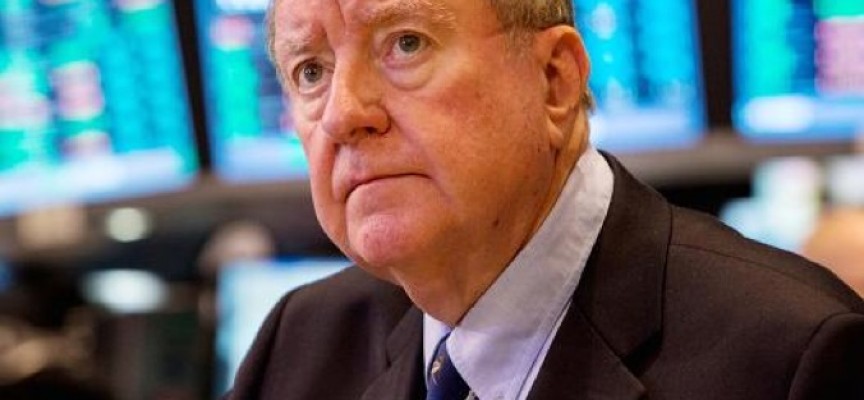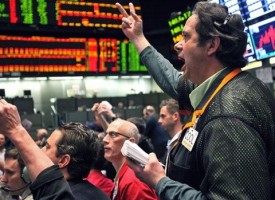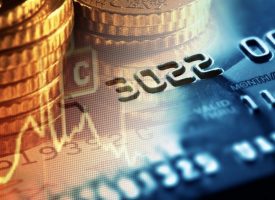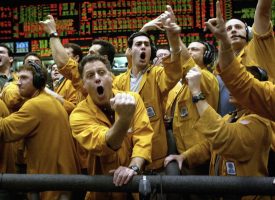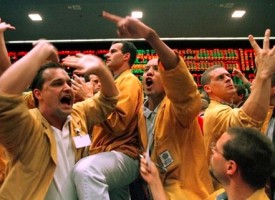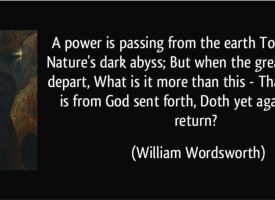Arthur Cashin, wise to the ways of Wall Street
Thomas Heath, Washington Post: The gentleman ambling across the storied floor of the New York Stock Exchange hardly looks the part of the Wall Street sage. Rumpled and affable, he could be your barber. Put an apron on him, roll up his sleeves and he might be your favorite bartender, right down to the deadpan quips.
But millions of financial news junkies know Arthur Cashin from his daily dispatches on CNBC, a reassuring voice in the topsy-turvy world of stock trading. When the market roils, as it has in recent weeks, his insights and nearly six decades of experience are what the cable news network puts forward to bring context and meaning.
And in an era when a White House tweet can quickly lay waste to billions in stock market value — including an unsettling amount in Americansʼ 401(k) plans — Cashin, 78, is Wall Streetʼs version of Walter Cronkite. He is one of the few financial minds with enough gravitas to scold Washington bigwigs without appearing political or to calm the half of the worldʼs billionaires who bank with Cashinʼs employer, UBS.
“Part of it is representation,” said Bob Pisani, a veteran CNBC reporter on the exchange floor who interviews Cashin regularly. “He is slightly rumpled. Always wears the same shirt and same ties. People say, ‘This is a guy I can relate to.ʼ He is an old-school market commentator in the best kind of way.”
Cashin speaks of the market as though it were a living entity, imputing human characteristics to one of the most dehumanizing aspects of capitalism. It can be “fearful,” “comfortable,” “sick” or “feeling toppy.”
Dennis Gartman, a longtime friend who publishes a daily commentary on the financial trade, said of Cashin, “He has seen it all, done it all, been through the bubbles, been through the crashes.”
‘Now there is just me’
Cashin is among the few surviving floor traders who came up during the clubby days of the last century. A trading floor that once teemed with brokers and specialists — barking orders for now-faded names such as Bethlehem Steel and F.W. Woolworth — has largely given way to algorithms that have rendered the frenzy of stock trading into robotic transactions.
“I managed a floor staff of between 55 and 60,” Cashin said. “Now there is just me.”
What havenʼt changed are the huge financial stakes and the emotional tumult they can cause, and Cashin has the ability to distill and interpret market information in a way that resonates with non-Wall Street types. He sprinkles his daily markets brief, called “Cashinʼs Comments,” with historical and cultural references ranging from Wild Bill Hickok to the sinking of the USS Indianapolis.
He doesnʼt sugarcoat news that can move markets. “Youʼre the victim of the next tweet, my boy,” he said of President Trumpʼs running commentaries on Twitter during one volatile market stretch in May.
When White House economic adviser Gary Cohn resigned in March 2018, Cashin cautioned that any more staff changes “might destabilize things.”
And Cashin is quick to call out what he views as doublespeak, even from Federal Reserve Chair Jerome H. Powell. “What the chairman did right now was he pulled a Goldilocks,” Cashin told CNBC, commenting on Powellʼs handling of interest-rate policy a year ago.
“Powell tap dancing very well up there,” he said on another occasion.
Two months ago, he warned that the slowdown in the global economy could reach these shores. “By the fourth quarter, you could be borderline recession,” he said. “We canʼt afford to let it drag on too long.”
Then came August, which proved especially chaotic for the markets after an upside-down bond market sounded recession alarms and the United States and China flogged each other with retaliatory tariffs. On Aug. 23, with trade tensions ratcheting up, Trump called his handpicked Fed chairman an “enemy” and demanded that U.S. companies stop doing business with China. The Dow Jones industrial average dived 623 points, or 2.37 percent.
“We may have a president who has learned his lesson,” Cashin said after the sell-off.
“I donʼt know what phone calls he got or didnʼt get,” Cashin calmly told a panel on CNBCʼs “Closing Bell.” “But I saw somebody who was trying to pull Friday back out of the fire. … I think heʼs going to be more modified from now on.”
“Arthur can say things that no one else says,” said Michael Farr, a Washington investor and fellow CNBC contributor. “He is the voice of the New York Stock Exchange. There is no one else the world listens to as closely or respectfully as Art Cashin.”
His life story
Cashin is an Irish American raconteur with a memory bank of tales that animate his life story.
Thereʼs the time when Cashin, in the middle of the night, has three continents waiting for his decision on a South African gold stock. His wife “turns over in bed and yells, ‘If I knew you were going to keep these hours, I would have married an obstetrician.ʼ ”
Of his only bid for political office, he said, “I ran for mayor of Jersey City once.” Then he waited a beat. “I came in 12th in a field of five.”
After graduating from Xavier High School in New York City in 1959, his parish priests put together the tuition for him to attend Fordham University. But his fatherʼs untimely death meant he had to get a job.
A family friend helped him find work as a clerk on Wall Street. And his smarts and disarming personality did the rest. At 23, he became a member of the NYSE and a partner of P.R. Herzig & Co. In 1980, he joined PaineWebber and managed its floor operations until PaineWebber was acquired by UBS in 2000.
The Floor back then was a daily scrum of Darwinian capitalists making trades for the white-shoe lawyers, bankers and financiers who presided high up in their offices. Like journalism and bookkeeping, it was once a place where a young man without a college degree could advance through sheer hustle.
“It was a melting pot,” said Ted Weisberg of Seaport Securities, who is a contemporary of Cashinʼs. “They came from all forms of life. Some with college degrees. Just you and me, face to face, trading money and changing hands.”
Automation has greatly reduced Cashinʼs staff in the past two decades. It did the same thing to the entire floor. There used to be close to 2,000 floor traders. Now there are a few hundred.
Cashin has become the floorʼs éminence grise. He is a steward of its traditions, which include raising money for charity and presiding over the NYSEʼs Buttonwood Club of 25-year veterans. On Christmas Eve, he leads a choir of traders singing “Wait Till the Sun Shines, Nellie,” a tradition that dates back more than 100 years.
On a typical day, he arrives at his Wall Street office in the Trump Building, a few dozen steps from the NYSE, by 5:30 a.m. He devours five newspapers in the 18 minutes it takes his driver — Cashinʼs one concession to success — to ferry him from his Jersey City home through the Holland Tunnel to work.
He works on “Cashinʼs Comments” with the help of an assistant, Judi Bartolomeo. (“One of the funny things is he has no skill at a computer,” Pisani said.)
After his daily comments clear UBS compliance, they are distributed to 100,000 of the investment bankʼs clients.
He spends about two-thirds of his day at his desk on the floor, where he puts on his reporting hat. “He is an old-school guy who calls up traders and asks, ‘What do you think,ʼ” Pisani said.
Just before noon, he does his on-camera interview with Pisani for CNBCʼs website. Then he eats lunch at his desk, which Pisani called a “nuclear waste site.”
“He has papers sitting there from the 1970s,” Pisani said. “He doesnʼt care. Thatʼs part of the charm.”
“Cashinʼs Comments” has made his reputation as a market seer trusted by many, the go-to guy for confirming news or debunking a rumor.
“Arthur is a very good observer of human nature,” Pisani said. “The thing that matters most is the sharpness of his observations combined with his congeniality. Art Cashin has almost no natural enemies.”
Holding court after hours
Cashin has two assigned seats: One is in a corner of the NYSE, the other is at a Bobby Vanʼs Steakhouse. Each weekday around 5 p.m., the Friends of Fermentation gather at the Bobby Vanʼs bar, across the street from the exchange, to talk politics, sports and that dayʼs trillions of dollarsʼ worth of market trades. As the fermenter-in-chief, Cashin presides. “Letʼs marinate some ice cubes,” he tells the invitees.
“People go across the street to just be with him,” said Kenny Polcari, who worked on the exchange floor for 34 years.
Pisani said he spent many a night there seeking Cashinʼs counsel.
“Building trust was not easy among the 5,000 people on the floor,” Pisani said, so he asked Cashin and another trader, Jimmy Maguire, for help. “The bottom line was Art and Jimmy went around the floor and said you can trust this guy Pisani. That really helped open doors.”
Cashin is partial to a good saloon. Itʼs where he learned the game.
“The things I learned in the saloons were not the same things you learn in places like the [MIT] Sloan School of Management,” he said. “Usually they were better.”
He reflected on those lessons between sips of Dewarʼs on ice.
“The reason I got into this business is there is nothing better,” Cashin said. “It was you versus the rest of the world. Itʼs a million people around the world trying to outsmart you.”
Though he accepts that technology has transformed his trade, he resists letting it take over his private life. Right down to his aversion to credit cards, which is most odd for someone at the center of the financial services industry.
“If you pay in cash, nobody knows where you drink, when you drink, how much you drink,” he said, peeling from a wad of bills to pay for a round. “With cash, you can have privacy.”
He slid off his bar stool and headed into the night and to the car waiting to take him home.
KWN note: Here is a link to the original Washington Post article CLICK HERE.

